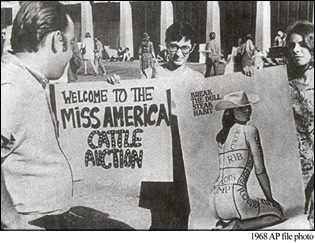
The mighty information aesthetics featured this Good Magazine video today, an infographic illustration of how porn underlies internet culture and economy, starring a porn performer, with the information writ upon her very flesh! No duh, we all say, and how 1968 Miss America Pageant protest turned horribly wrong.
This is the point I don’t get about librarians’ ambiguous role as arbiters of new and emerging Web technologies, when illicit content plays a large role in spurring and spreading the mass adaptation of such. I think it probably goes without saying that I’ve been conditioned by generation and profession to be both relentlessly sex positive as well as new-technology positive, so I want nothing less (and fear nothing more) than to be a naysayer. But I think that we need to acknowlege the complicated nature of techonology delivery. Almost every tech innovation we talk about now had a pall of the adult industry a few years ago- porn has driven major technological shifts, from VHS to web cams, to teledildonics. Look at Second Life- casual projections put its sex industry at 30 per cent of the total economy. And in the weird socially conservative world we live in, it’s not proper to critically respond to exposure to porn culture, because that’s too direct a mention of sex. Can we talk about how this might be a barrier to conceptualizing service, or how pushing something hard without talking about how people have experienced it might be a little insensitive?
And again, what’s up with Good Magazine? Sweetly totalitarian ethics?!



 Posted by Amelia Abreu
Posted by Amelia Abreu 

